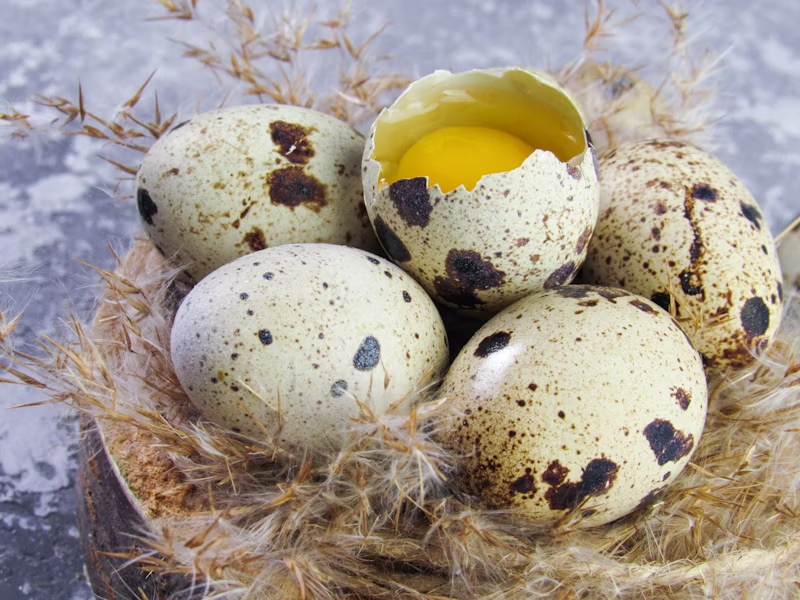Quail Eggs: Tiny Nutritional Powerhouses
Quail eggs are small but mighty powerhouses of nutrition. These tiny eggs pack a punch with their impressive array of vitamins, minerals, and proteins. While they may not be as common as chicken eggs, quail eggs offer unique health benefits that are worth exploring.

Quail eggs are small but mighty powerhouses of nutrition. These tiny eggs pack a punch with their impressive array of vitamins, minerals, and proteins. While they may not be as common as chicken eggs, quail eggs offer unique health benefits that are worth exploring.
Quail eggs contain higher concentrations of several nutrients compared to chicken eggs, including vitamins B1, B2, and B6, as well as iron and antioxidants. Their nutrient density makes them an excellent addition to a balanced diet. These eggs are also rich in essential amino acids, which are crucial for various bodily functions and overall health.
The potential health benefits of quail eggs are numerous. They may aid heart health due to their beneficial fatty acid content, support eye health with their high vitamin A content, and even help alleviate allergy symptoms. Additionally, the high protein content in quail eggs can contribute to muscle growth and repair, making them a valuable food for athletes and fitness enthusiasts.
Nutritional Profile of Quail Eggs
Quail eggs pack a powerful nutritional punch despite their small size. These tiny eggs offer a rich array of vitamins, minerals, and macronutrients that contribute to overall health and well-being.
Comparative Analysis with Chicken Eggs
Quail eggs are nutritionally dense compared to chicken eggs. They contain higher concentrations of several key nutrients. For instance, quail eggs provide about 13% more protein by weight than chicken eggs. They also boast nearly triple the iron content.
Vitamin B12 is significantly more abundant in quail eggs, offering 66% of the daily value compared to 43% in chicken eggs. Quail eggs contain more riboflavin and folate as well.
In terms of fat content, quail eggs have a higher percentage of healthy fats. However, they also contain more cholesterol per gram than chicken eggs.
Vitamins and Minerals Breakdown
Quail eggs are rich in essential vitamins and minerals. They are an excellent source of vitamin A, crucial for eye health and immune function.
Selenium content is notable, providing 5% of the daily value per egg. Selenium supports thyroid function and acts as an antioxidant.
Other minerals present in significant amounts include:
- Phosphorus
- Zinc
- Iron
Quail eggs also contain choline, important for brain health and metabolism. The B-vitamin complex in quail eggs includes riboflavin, folate, and pantothenic acid, supporting energy production and cell function.
Macronutrients: Proteins, Fats, and Carbohydrates
Protein is a key macronutrient in quail eggs. They provide about 13 grams of protein per 100 grams, making them a complete protein source with all essential amino acids.
The fat profile of quail eggs is balanced. They contain both saturated and unsaturated fats, with a higher proportion of healthy fats compared to chicken eggs.
Carbohydrate content in quail eggs is minimal. They contain no fiber and only trace amounts of sugars.
Calorie-wise, quail eggs are relatively energy-dense. A single quail egg provides about 14 calories, with most of the energy coming from protein and fat.
Health Benefits of Incorporating Quail Eggs into Your Diet
Quail eggs offer a range of health benefits when included in a balanced diet. These nutrient-dense eggs can support various bodily functions and promote overall wellbeing.
Enhanced Immune Function and Allergy Responses
Quail eggs contain compounds that may boost immunity and help manage allergies. The ovomucoid protein found in quail eggs has anti-allergenic properties, potentially reducing allergic reactions.
These eggs are rich in antioxidants, which help protect cells from damage and support the immune system. Their high vitamin E content further enhances immune function.
Quail eggs also contain nutrients that aid in blood cell formation, contributing to a stronger immune response. Regular consumption may help the body better defend against infections and illnesses.
Support for Vision and Muscle Development
Quail eggs provide essential nutrients for eye health and muscle growth. They contain vitamin A, which is crucial for maintaining good vision and preventing eye disorders.
The high-quality protein in quail eggs supports muscle development and repair. This makes them an excellent snack for athletes or those looking to build lean muscle mass.
These eggs also contain minerals like calcium, magnesium, and potassium, which are important for muscle function and contraction. Including quail eggs in the diet can help maintain strong, healthy muscles.
Cardiovascular and Thyroid Health
Quail eggs contain beneficial fatty acids that may support heart health. They can help balance cholesterol levels when consumed in moderation as part of a healthy diet.
These eggs are a good source of selenium, which is essential for proper thyroid function. The thyroid gland plays a crucial role in regulating metabolism and energy levels.
Quail eggs also contain nutrients that may help reduce inflammation in the body. Chronic inflammation is linked to various cardiovascular issues, so managing it is important for heart health.
Skin and Hair Health Benefits
The nutrients in quail eggs can contribute to healthier skin and hair. Their high vitamin B complex content supports skin cell regeneration and may help reduce signs of aging.
Quail eggs are rich in protein, which is essential for hair growth and strength. The biotin in these eggs also promotes healthy hair and may prevent hair loss.
The antioxidants in quail eggs help protect skin cells from damage caused by free radicals. This can lead to a more youthful appearance and improved skin texture.
While quail eggs offer many benefits, it's important to consume them as part of a varied diet. As with any food, moderation is key to avoid potential side effects.
Want more posts like this?Sign up for our FREE newsletter →